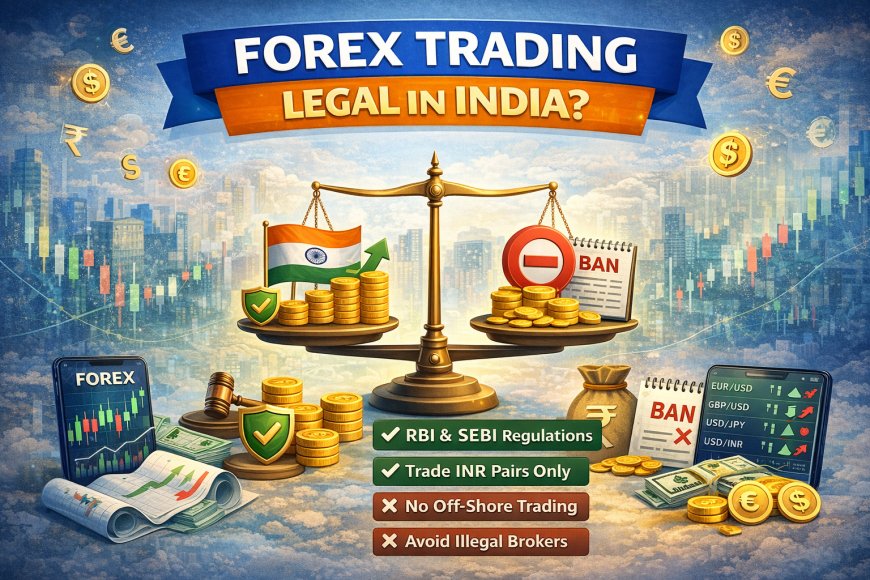Is Forex Trading Legal in India?
Learn whether forex trading is legal in India in 2025. Discover RBI & SEBI rules, approved currency pairs, what’s banned, penalties for violations, and safe trading tips. A complete guide for beginners and professionals to trade forex legally in India without breaking the law.

Introduction
If you’ve ever wondered, “Is forex trading legal in India?”, you’re not alone.
With promises of high returns and global market access, forex is attracting thousands of Indian traders. But here’s the truth — yes, it’s legal in India… but only under strict rules.
In this 2025 guide, you’ll learn:
-
The exact RBI & SEBI forex rules
-
Which currency pairs are legal
-
What’s banned (and why)
-
Penalties for illegal forex trading
-
Safe steps to trade without breaking the law
1. The Law Behind Forex Trading in India
Forex trading in India is governed by:
-
Foreign Exchange Management Act (FEMA), 1999
-
Regulated by the Reserve Bank of India (RBI)
-
Monitored by Securities and Exchange Board of India (SEBI)
Key points:
-
Only authorized brokers can offer forex trading.
-
All trading must be through Indian exchanges — NSE, BSE, MSE.
-
Only approved currency pairs can be traded.
2. Legal Currency Pairs in India
Allowed INR-based Pairs (Futures & Options)
-
USD/INR
-
EUR/INR
-
GBP/INR
-
JPY/INR
Approved Cross-Currency Pairs (On Indian Exchanges Only)
-
EUR/USD
-
GBP/USD
-
USD/JPY
Note: You can only trade these on Indian exchanges via SEBI-registered brokers.
3. What’s NOT Allowed
Here’s what’s illegal in India for retail traders:
-
Trading via offshore brokers (Exness, XM, OctaFX, etc.)
-
Spot forex trading
-
CFDs, binary options, crypto-forex hybrids
-
High leverage (1:500, etc.) from foreign brokers
-
Using LRS to fund foreign forex accounts
4. Penalties for Illegal Forex Trading
Breaking RBI and FEMA rules can be very costly:
-
Fines: Up to 3× the transaction amount or ₹2 lakh per transaction
-
Daily penalties until the violation stops
-
Imprisonment: 5–10 years for serious violations
-
Account freezes & Income Tax/ED action
Example:
In 2025, the ED froze ₹3.9 crore in accounts linked to an illegal forex platform in Kerala.
5. How to Trade Forex Legally in India
Follow these steps for safe & legal trading:
-
Select a SEBI-registered broker — Zerodha, Upstox, ICICI Direct, Angel One, HDFC Securities.
-
Complete KYC — PAN, Aadhaar, bank details.
-
Trade only legal currency pairs on NSE, BSE, or MSE.
-
Avoid offshore apps offering huge leverage.
-
Report profits in ITR-3 and pay applicable taxes.
-
Use risk management — stop-loss, low leverage (1:10–1:50), avoid overtrading.
6. Tax Rules for Forex Trading in India
-
Business income: Profits from forex are taxed according to your income slab.
-
ITR-3 filing: Compulsory for active traders.
-
Expense claims: Brokerage, internet, research costs can be deducted.
-
No tax evasion loophole: Even if you pay taxes, illegal forex activity is still punishable.
7. Forex Trading Trends in India (2025)
-
RBI easing trade rules — Rupee-based Vostro accounts & overseas settlement accounts.
-
Non-Deliverable Forwards (NDFs) — Used to control rupee volatility.
-
Hedging demand surge — More businesses using forward contracts.
-
Foreign Vostro investment — Now allowed in government securities.
8. Quick Reference Table
| Aspect | Legal | Illegal |
|---|---|---|
| Instruments | Currency Futures & Options on NSE/BSE/MSE | Spot, CFDs, Binary, Crypto-Forex |
| Pairs | USD/INR, EUR/INR, GBP/INR, JPY/INR + some cross pairs | Any other pairs via offshore brokers |
| Platforms | SEBI-registered brokers | Offshore brokers/apps |
| Funding | Domestic bank transfers | LRS remittance for leveraged forex |
| Penalties | Stay compliant | Fines, jail, ED action |
Conclusion
Forex trading is legal in India — but only if you stick to the rules.
To stay safe:
-
Trade only approved pairs via SEBI-registered brokers.
-
Avoid offshore platforms & high leverage scams.
-
Stay updated on RBI & SEBI regulations.
The bottom line: Trade smart, trade safe, and stay on the right side of the law.




